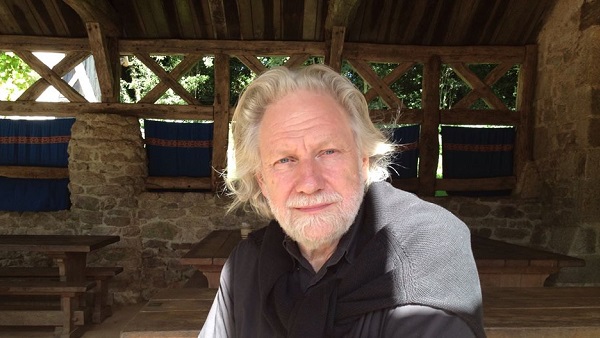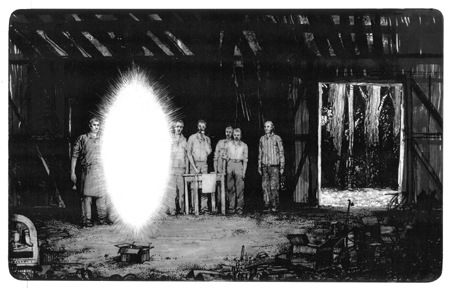Poet to painter, my twin: Jan Valentin Saether
Sunday, January 14th, 2018[ by Charles Cameron — Jan Valentin Saether, requiescat in pacem ]
.
Jan Valentin Saether, priest and painter extraordinaire
**
Hanne Elisabeth Storm Ofteland wrote, bless her:
I am devastated! On the 11th of January at 11:45 pm my beautiful partner-in-insanity, Jan Valentin Saether, left this planet. Safe journey back to the Andromeda Galaxy, my sweet, precious, wonderful husband. I love you so much
**
Jan Valentin Saether was — it is hard to claim such kinship in the midst of so many others with their own griefs — my twin, poet to painter. We both regarded our respective arts as gifts to be given onwards, and emphasized creative innovation within continuing tradition.
I am so sad.
This runs deep — and meanwhile I am doing fine, writing other unrelated things and allowing my grief to well up from time to time, between paragraphs, between breaths.
**
Such lovely artwork — two pieces here featuring the vesica piscis, among the most elegant of mathematical and significant of archetypal forms. My first example comes from his book, The Viloshin Letters, which I helped him with in the early days. Here the vesica shows the bursting forth of the radiance into ordinary life — key to all of Jan’s work:
The second, perhaps subtler work, was indeed first called Vesica and now Epiphany. Here the breakthrough is shown in shadow-and-light — chiaroscuro — of which Jan was such a master:
The actual work is wall-sized — depending on your wall.
I am in awe of this painting.
**
Today another dear friend, Mitch Ditkoff, beauttifully and powerfully told the story of his father’s death on FB, and wrote in conclusion:
If you are reading this, there’s a good chance that someone close to you has died: your mother, father, grandparents, child, or best friend. And there’s also a good chance you have witnessed something profound in their passing, whether you were physically with them at the time or not. Be willing to share that story with others! It is not ego to tell this story. On the contrary, it’s the dissolution of ego – your opportunity to remind another person, without preaching, just how sacred each and every breath is.
I would like to tell my story of Jan Valentin Saether, to say how much I loved him, learned from him, and felt when I heard of his passing. And to mention the sacredness of breath.
**
I must have met Jan sometime in the earlyn 1980s. He was teaching in Malibu, I was living in Malibu in a friend’s house, and saw some paintings of his in a folio, one of a naked woman reaching towards the viewer — and I thought he was a rock-n-roll-star type, not only not interesting but downright unpleasant.
Next thing, I was over at his place for an evening, and discovered a fellow artist, a fellow admirer of CG Jung and the mundus imaginalis, a fellow lover of the sacred in every moment. We were still talking when his then wife brought the pair of us breakfast.
Our parallel views on the sacred gifts of the arts, and the need to combine traditional and contemporary means of expression in service to the sacred — it forged a friendship, a kinship, a twinning between us.
Later, Jan asked me to take over his Sunday lecture series while he went to Oslo for a month or so. A few Sundays later, I was in mid sentence in a lecture on poetry when Jan came into the room. I got up out of the chair and offered it him, and he sat down and continued my own half-formed sentence seamlessly, turning the metaphor from sacred poetry to sacred art.
Later still, he invited me to teach creativity at Bruchion — the school of the sacred his studio in Culver City had become, named for the area in ancient Alexandria that housed its celebrated library. It was during one of my talks on creativity there that I began to play around — on the table-tennis table — with the elements that would decades later become my HipBone Games.
Jan Valentin Saether was the priest — of the Ecclesia Gnostica — who celebrated my marriage to Annie, mother of my sons.
Jan was my last and best fellow artist and friend — my twin.
**
Years ago I wrote a paragraph about his paintings:
Jan Isak Saether’s work bears little resemblance to current fashions in the world of art. At first glance perhaps, it reminds us of the works of the old masters. But as we peer deeper, we sense a curious quality: Saether’s work does not bring us the easy, settled feel that we associate with the old, but a disturbing hint of drama, of the unexpected. It is as though one of the old masters had rejoined us in this latter part of the twentieth century, and after studying and absorbing all that the great moderns from Kandinsky to Francis Bacon had to offer, has turned his mind and heart to the stormy times in which we live, and out of that thunderous darkness has generated lightning. Recent currents and fashions in art have brought us visions of what it is to be human that are by turns bleak, comic, deranged, and superficial. In Saether’s work, by contrast, we find a portrayal of our humanity that contains both glory and shadow. Saether is no throwback to the past. He is a Velasquez who has learned from Bacon, a true student of both modern and ancient masters who now turns his hand to the great synthesis. It is often said that we can recognize the true artists because they give us new eyes with which to see the world, and create new worlds for us to see. Jan Saether’s work faces the future as only a work rooted in the past can, and we are the richer for his courage in bringing his deep dreams into our lives.
That captures my admiration, but not my love.
My love for Jan Valentin Saether can only be told by the loss, the grief I shall feel in my remaining days.
Each breath we have is sacred.
I shall miss him, in my quiet way, furiously.





